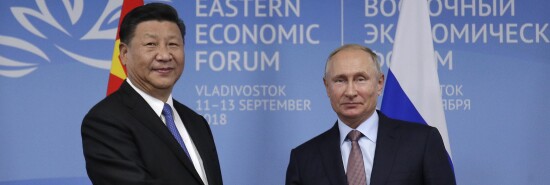
How China is using the Ukraine war to advance its own authoritarian agenda
Simone Gao
As the war in Ukraine rages on, Chinese President Xi Jinping‘s recent visit to Moscow has signaled a high-profile alliance between China and Russia. This alliance raises questions about why Xi is defying international expectations at a time when China needs to ease tensions with the West and Russia faces setbacks in Ukraine.
A key reason is that Xi cannot afford Russian President Vladimir Putin‘s downfall, as he would lose his most important ally against the West, causing the so-called camp for a new world order to disintegrate. Xi’s primary concern is Putin remaining in power, with the Russia-Ukraine war serving as an advantageous backdrop for his plans regarding Taiwan.
AMERICANS MUST RECOGNIZE THAT MACRON HAS CHOSEN CHINA
China’s approach to Taiwan relies heavily on the united front tactic, which includes but is not limited to infiltration, persuasion, brainwashing, inciting rebellion, and coercion. This approach is more favorable to the Chinese Communist Party than a full military invasion, given China’s current economic downturn and the risks of a direct confrontation with Western alliances. The war in Ukraine presents conditions that make the united front tactic more effective.
What could also make China’s united front tactic more effective is Taiwan’s mentality, which has shifted since the beginning of the Russia-Ukraine conflict. Taiwan’s focus now is on maintaining peace for as long as possible. This change is evident in the Democratic Progressive Party’s presidential campaign slogan, which went from “Resist China and Protect Taiwan” in 2020 to “Peace and Protect Taiwan” ahead of 2024.
Likewise, surveys conducted at the end of last year show the majority of Taiwanese prefer adopting moderate policies to avoid cross-strait tensions rather than strengthening the military. But this mindset will only help the CCP implement its cohesion strategy, which could involve a combination of blockade and united front tactics. By imposing a blockade on Taiwan, not as a prelude to an amphibious landing but as a precursor to a united front effort, the CCP would aim to weaken Taiwan’s will to resist.
One assessment the CCP holds is that if Taiwan is blockaded or civilian traffic is intimidated for a few months, the will to resist will collapse, leading to acceptance of the CCP’s demands for reunification. While the United States and its allies will likely intervene, they will not be able to prevent the blockade entirely. During this period, the CCP’s covert front will incite activities such as civilian demonstrations demanding peace, pro-CCP media brainwashing, social media bombardment, and damaging Taiwan’s cyber infrastructure, etc. The intent is to attack from inside and outside, triggering a Taiwanese capitulation.
China has already begun implementing this strategy. During and immediately after Taiwanese President Tsai Ing-wen’s return from a visit to the U.S. last week, the Chinese People’s Liberation Army launched a serious action involving combat readiness patrols and military exercises. China’s Fujian Maritime Bureau initiated a “special joint patrol and inspection operation” program in the northern part of the Taiwan Strait to conduct so-called traffic management and maintain maritime order.
Taiwanese expert Wang Kun-yi argued this is China’s attempt to “internalize” and exercise effective control over the Taiwan Strait since the term “patrol” is used only within one’s own territorial waters. These actions should not be seen merely as protests against Tsai’s visit to the U.S. Instead, they should be seen as a preparation for China’s blockade of Taiwan, as indicated by analyst Carl Schuster, a former director of operations at the U.S. Pacific Command’s Joint Intelligence Center.
How does China’s alliance with Russia fit into all of this? The war in Ukraine is critical for the CCP’s strategy. If Russia is defeated, Taiwan’s morale will surge, and the likelihood of surrender will decrease dramatically. Moreover, doubt and dissent would grow within China.
A Russia-Ukraine conflict, however, would divert Europe and the U.S.’s attention. Moreover, a drawn-out war with Ukraine suffering immense losses would discourage the Taiwanese from resisting. Look, China will say, the West didn’t really help Ukraine, and if Taiwan hopes to avoid a similar fate, it should embrace the CCP’s proposal for peaceful reunification.
In the unlikely event that the CCP opts for an all-out war to bring Taiwan under its control, it would not want the war in Ukraine to conclude with Russia’s catastrophic defeat. Such an outcome would lead to the loss of a crucial ally, possible interruptions in energy supplies, rising domestic pressure, a more self-assured Taiwan, and the U.S. and its allies focusing their efforts on the CCP.
This is why the U.S. and its allies must strive to make the speedy defeat of Russia a reality while remaining vigilant about China’s united front offensive.
CLICK HERE TO READ MORE FROM RESTORING AMERICA
Simone Gao is a journalist and host of “Zooming In With Simone Gao,” an online current-affairs program.
